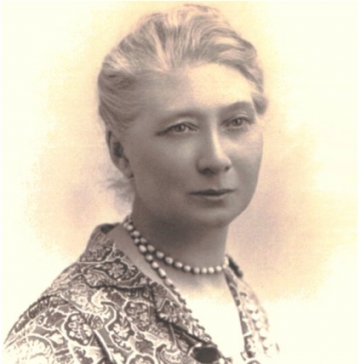Violet Ann Bland
The full resource is FREE to all registered users of the website
If you are not already registered you can sign up for FREE website access to download the full resource.

- Born: 1863
- Died: 1940
- Claim to fame: Prominent Bristol campaigner who worked in domestic service in her youth
Early life
Violet was born in Shropshire and was a manual labourer’s daughter. As a young girl, she went into domestic service. Like most servants, she was poorly paid and had few opportunities; it is unknown, therefore, how in the 1900s she was running a Ladies College of Domestic Science and owning and running her own guest house in Bristol.
The college at Henley Grove, which Violet appears to have owned, offered talks and classes on hygienic cooking, vegetarianism and gymnastics. Henley Grove was described by Violet as a ‘manorly’ establishment, having 15 acres of land and eight or so bedrooms.
Campaigning
In 1909, Violet become an active member of the Bristol branch of the WSPU, providing hospitality for WSPU gatherings on numerous occasions. Her garden was described as lavishly decorated for the reception of suffragette Lillian Dove-Wilcox and others on their release from prison.
In 1910, she moved to London, where she ran a smaller guest house in Burlington Street in the West End. Her commitment to the suffrage cause became more active at that point and she was arrested that year during the ‘Black Friday’ suffragette demonstrations but, like many others, was discharged. In 1912, she was arrested for breaking windows in frustration, as she said in court, at having paid ‘rates and taxes to the tune of nearly £1 a week for twenty years’ and still without a vote. She was sentenced to four months served in Aylesbury Prison, Buckinghamshire, where she went on hunger strike and was forcibly fed. She gave a description of this horrific experience to the Votes for Women newspaper in 1912.
Violet never married and, in 1915, she adopted the four young children of her sister after she died. A Fund for Providing Comforts for Serbian Soldiers and Prisoners in 1917, because of the First World War, was based at the same address as Violet’s guest house, and it is likely that she was directly involved with the fund. Violet ran her guest house until 1935. She died five years later.
Glossary
- Domestic servants: These included maids, cooks and cleaners, often living in the home of the person they worked for. Children, especially girls, could ‘go into service’ as young as ten years of age.
- Votes for Women: This newspaper was one of the official suffrage newspapers that were sold around the UK.
Questions
- Why was it important that women from different backgrounds were involved with the campaign?
- Why was it important that Violet shared her experience of prison and being force-fed?
- How many of the women in the case studies were able to spend time actively campaigning for suffrage while also working?
